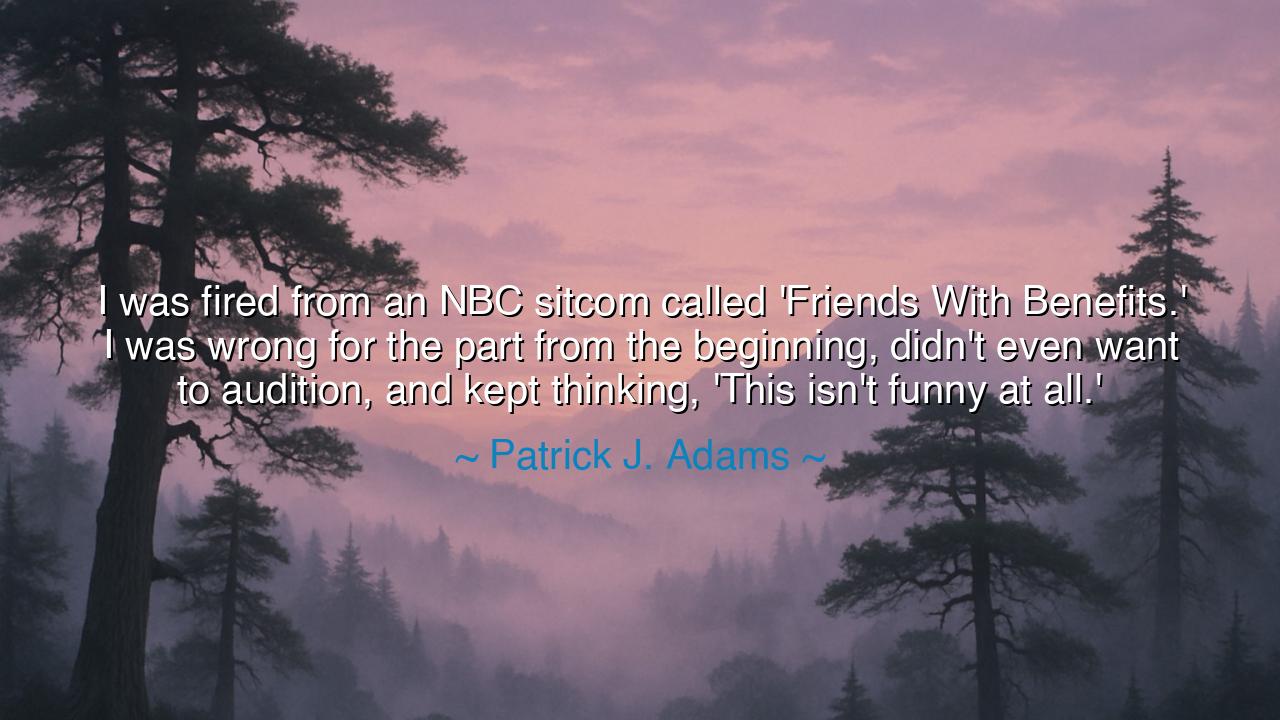
I was fired from an NBC sitcom called 'Friends With Benefits.' I
I was fired from an NBC sitcom called 'Friends With Benefits.' I was wrong for the part from the beginning, didn't even want to audition, and kept thinking, 'This isn't funny at all.'






The actor Patrick J. Adams, known for his intelligence and humility, once reflected: “I was fired from an NBC sitcom called Friends With Benefits. I was wrong for the part from the beginning, didn’t even want to audition, and kept thinking, ‘This isn’t funny at all.’” In this confession lies a truth that transcends the world of acting — a truth about failure, authenticity, and destiny. These words, though rooted in a personal setback, echo the wisdom of the ancients: that not every path is meant for us, and that to be removed from one place may be the first step toward finding where we truly belong.
To the ancients, being “wrong for the part” was not a disgrace, but an act of divine correction. The Greeks believed that when a man strayed from his true calling, the gods would gently — or violently — steer him back. Patrick’s firing was not punishment but redirection. He had entered a role that did not fit his spirit, and though he tried to force himself into its mold, his own truth rebelled. “I kept thinking, ‘This isn’t funny at all,’” he says — a whisper from the soul that something within was misaligned. The ancient philosophers called this the voice of the daimon, the inner guide that leads each person to their proper destiny.
In his humility, Patrick recognizes that his failure was not external but internal. He knew from the beginning that he did not belong there. The wise among our forebears would call this a lesson in authenticity — that when one acts against one’s own nature, the universe will resist. To persist in falsehood, even for comfort or gain, is to court ruin. Yet to accept failure with grace, to see it not as an end but as instruction, is to walk the path of wisdom. In this, Patrick’s story mirrors that of many before him who were cast down only to rise stronger in truth.
Consider the tale of Demosthenes, the great orator of Athens. As a young man, he dreamed of speaking before the people, but when he first stood in the assembly, he was mocked for his stutter and trembling voice. The crowd laughed him from the podium. Yet Demosthenes did not curse fate — he listened to it. He withdrew to the shore and trained his speech by shouting over the waves, placing pebbles in his mouth to strengthen his tongue. He became, in time, the voice of Greece. His first failure, like Patrick’s, was not rejection — it was revelation. It told him who he was not, so he could discover who he was meant to be.
Patrick J. Adams would later rise to acclaim in Suits, a role perfectly attuned to his nature — intellectual, earnest, grounded. There, his spirit harmonized with his craft, and his truth found expression. This is the heart of the lesson: failure often clears the way for alignment. What we lose unwillingly may be what our soul could not carry forward. The ancients called this eu pronoia, “good providence” — the mysterious wisdom that guides us, even through disappointment.
And yet, there is humor in Patrick’s words, for he calls the experience “funny.” This laughter is not mockery, but enlightenment. It is the laughter of one who has survived disillusionment and seen its deeper meaning. To laugh at one’s own missteps is to stand above them, to recognize that life’s script is not written by ego, but by purpose. The ancients taught that tragedy and comedy are twins — that what humbles us today may uplift us tomorrow. To find laughter in failure is to taste the freedom of wisdom.
Thus, the lesson of Patrick J. Adams is clear: listen to the quiet truth within you. When your spirit whispers “this isn’t right,” have the courage to turn away, even if the world calls it an opportunity. When failure comes, receive it as a teacher, not an enemy. Do not mourn the doors that close, for behind them lie paths that are not yours to walk. Instead, prepare yourself — study, reflect, and wait for the place where your talents meet purpose.
And so, dear listener, remember this: the one who is fired from falsehood is being freed for truth. Do not cling to what does not resonate with your heart, for no reward can outweigh the peace of authenticity. When life removes you from a role that was never yours, bow in gratitude — for the universe, in its strange mercy, is rewriting your story toward what is real. Like Patrick, you will one day look back, smile, and say, “It wasn’t right — and thank the heavens, it wasn’t meant to be.”






AAdministratorAdministrator
Welcome, honored guests. Please leave a comment, we will respond soon